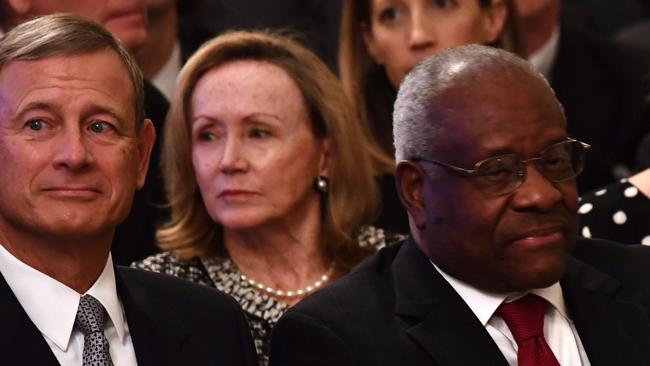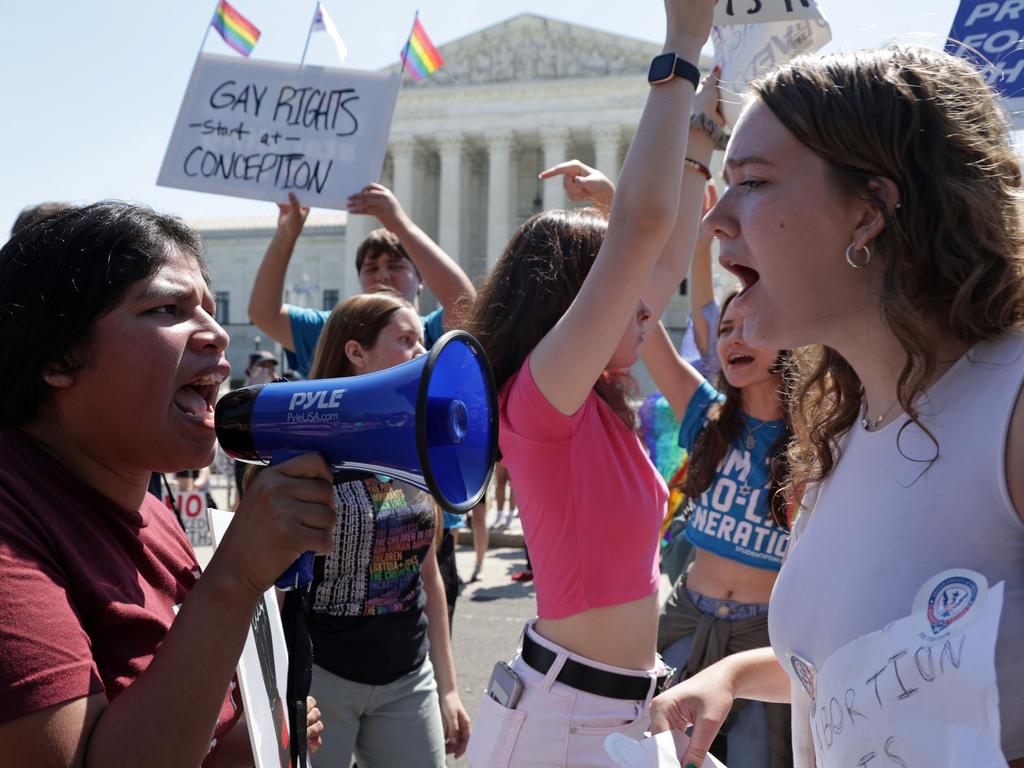Clarence Thomas’s abortion opinion revisits same-sex marriage, contraception
Many conservatives say prospect of court taking another look at widely accepted decisions is remote, calling them more settled than Roe.

When the Supreme Court removed the constitutional right to an abortion, most of the justices in the majority focused on what they described as the “egregiously wrong” ruling that established that right in Roe v. Wade in 1973.
Justice Clarence Thomas took a broader view. In his opinion concurring with the majority, he wrote that if the legal underpinnings of Roe v. Wade were wrong, then so were the underpinnings of other rights not enumerated in the Constitution that the court recognised in recent decades. They include the right of married couples to use contraception, the right to same-sex romantic relationships and, in 2015, the right to same-sex marriage.
Justice Thomas’s stance raised the prospect that new challenges would soon be mounted against those rights, keying off the decision in the abortion case, Dobbs v. Jackson Women’s Health Organization.
The possibility that Friday’s ruling will have much greater applicability is an argument central to the dissent by the three liberal-leaning justices. Justices Stephen Breyer, Sonia Sotomayor and Elena Kagan wrote: “Today’s opinion will fuel the fight to get contraception, and any other issues with a moral dimension, out of the Fourteenth Amendment and into state legislatures.” A number of conservative legal scholars argued, as Justice Samuel Alito did in his opinion, that Roe was a special case. “Nothing in this opinion should be understood to cast doubt on precedents that do not concern abortion,” the justice wrote.
Sarah Parshall Perry, a lawyer at the conservative Heritage Foundation who worked in the Trump administration, said she sees no appetite among the other conservatives on the bench for revisiting rights that have become more accepted and entrenched in American life than Roe ever was.
“I don’t think there are the votes for re-examination of those other precedents,” she said. “Abortion is inherently different ... Roe has always stuck out as a particularly egregious decision.” Ms Perry said repealing Roe has always been a singular focus for conservatives because of how poorly reasoned they think the ruling was and because they see it as bearing on the right not only of a consenting individual, but also on the fetus’s right to a life.
Ms Perry said she expects that the court will be petitioned to revisit the issues in cases mentioned by Justice Thomas but that the current composition of the court suggests those petitions will be quickly turned away. “I’m virtually certain we won’t see the court granting them,” Ms. Perry said.
Justice Brett Kavanaugh wrote a concurring opinion that distanced him from Justice Thomas.
“I emphasise what the Court today states: Overruling Roe does not mean the overruling of those precedents, and does not threaten or cast doubt on those precedents,” Justice Kavanaugh wrote.
In his concurrence, Justice Thomas referred specifically to three cases that he considered to be on the same shaky constitutional footing as Roe: Griswold v. Connecticut (1965), which established the right of married couples to use contraception; Lawrence v. Texas (2003), which protects the right to same-sex romantic relationships; and Obergefell v. Hodges (2015), which establishes the right to same-sex marriage.
Justice Thomas said those cases – which some call “substantive due-process” cases – were wrongly decided because the court interpreted the 14th Amendment, adopted in 1868 to assure “due process of law” and “equal protection of the laws,” as establishing rights that the nation’s founders never intended.
The justices therefore have a duty, he wrote, to “correct the error” established in those precedents.
Justice Thomas’s views on those cases are no surprise to those familiar with his judicial thinking, said David Upham, a legal scholar at the University of Dallas who publicly disagreed with the 2015 decision that recognised same-sex marriage.
“He is saying things he has said in the past,” Mr Upham said. Mr Upham said that, as social mores have shifted, the political will for revisiting Griswold has vanished.
“The contraceptive decisions are untouchable,” Mr Upham said. “It’s not about constitutional law. It’s about the political reality that there aren’t a substantial number of people who would like to see that case revisited.” Kris Ullman, president of the conservative Eagle Forum advocacy group, said: “There is a huge difference between abortion and contraception. This idea that all these other rights are in danger – that’s a scare tactic by the left.” Some anti-abortion groups, such as Students for Life of America, consider “Plan B” emergency contraceptives and intra-uterine devices, or IUDs, to be abortifacients and have pushed to limit access to them. Where that line is drawn in jurisdictions across the country could give rise to legal battles, as could questions of which circumstances of a mother’s pregnancy qualify as exceptions to state abortion bans.
“I do think this opens up new battlegrounds for the court; it could be open season on what rights are protected by the Constitution,” said Joseph Thai, a University of Oklahoma law professor. Conservative views that once were confined to dissenting opinions, he added, “now can become majority opinions if you can count to five votes.” “Today, Justice Thomas is an island unto himself,” said Jessica Levinson, a professor at Loyola Law School in Los Angeles. “While the majority goes to pains to say this is just about abortion and nothing else, the majority’s reasoning calls into question as to whether that is truly the case. Thomas could soon have visitors on his island.” Mr Upham dismissed that view, saying he sees no desire among politicians or the court’s conservative justices to push for overturning Obergefell, the same-sex marriage decision.
“I don’t think it’s likely, and I say this as someone who would like to see these precedents revisited,” Mr Upham said.
At this point, he said, there is strong support for same-sex marriage among many Americans – and general acquiescence by people who once opposed it.
The Wall Street Journal





To join the conversation, please log in. Don't have an account? Register
Join the conversation, you are commenting as Logout